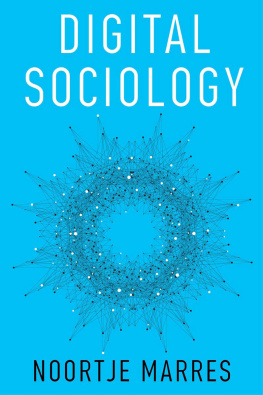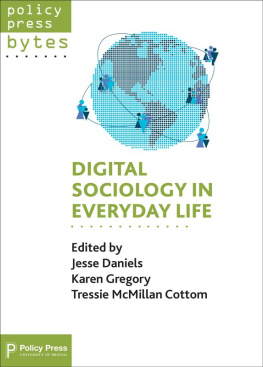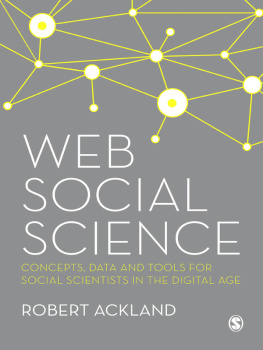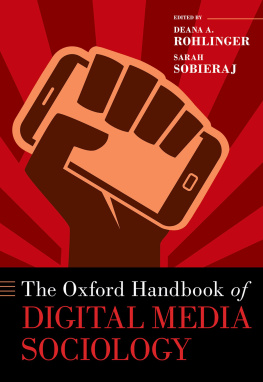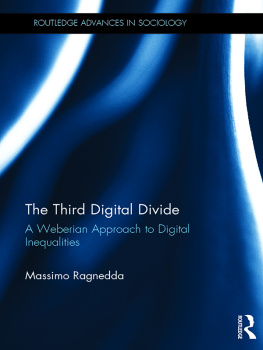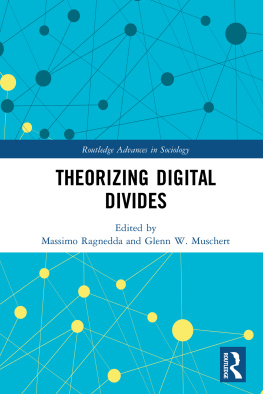Contents
Guide
Pages

Just because its called social, doesnt make it social Emma Uprichard, Summer 2012
Digital Sociology
The Reinvention of Social Research
Noortje Marres
polity
Copyright Noortje Marres 2017
The right of Noortje Marres to be identified as Author of this Work has been asserted in accordance with the UK Copyright, Designs and Patents Act 1988.
First published in 2017 by Polity Press
Polity Press
65 Bridge Street
Cambridge CB2 1UR, UK
Polity Press
350 Main Street
Malden, MA 02148, USA
All rights reserved. Except for the quotation of short passages for the purpose of criticism and review, no part of this publication may be reproduced, stored in a retrieval system, or transmitted, in any form or by any means, electronic, mechanical, photocopying, recording or otherwise, without the prior permission of the publisher.
ISBN-13: 978-0-7456-8482-6
A catalogue record for this book is available from the British Library.
Library of Congress Cataloging-in-Publication Data
Names: Marres, Noortje, 1975- author.
Title: Digital sociology : the reinvention of social research / Noortje Marres.
Description: Malden, MA : Polity, 2017. | Includes bibliographical references and index.
Identifiers: LCCN 2016038449 (print) | LCCN 2017005356 (ebook) | ISBN 9780745684789 (hardback) | ISBN 9780745684796 (paperback) | ISBN 9780745684819 (Mobi) | ISBN 9780745684826 (Epub)
Subjects: LCSH: Sociology. | Social sciences--Research. | Technological innovations--Social aspects. | BISAC: SOCIAL SCIENCE / Sociology / General.
Classification: LCC HM585 .M34567 2017 (print) | LCC HM585 (ebook) | DDC 301.01--dc23
LC record available at https://lccn.loc.gov/2016038449
The publisher has used its best endeavours to ensure that the URLs for external websites referred to in this book are correct and active at the time of going to press. However, the publisher has no responsibility for the websites and can make no guarantee that a site will remain live or that the content is or will remain appropriate.
Every effort has been made to trace all copyright holders, but if any have been inadvertently overlooked the publisher will be pleased to include any necessary credits in any subsequent reprint or edition.
For further information on Polity, visit our website: politybooks.com
Acknowledgements
If books are the result of collaboration, this applies only more so to a book about the digital. A big thank you goes to my collaborators, with whom it has been a pleasure imagining possibilities and developing ideas, many of which found their way into this book: in particular, Carolin Gerlitz, David Moats and Esther Weltevrede. I am grateful to Celia Lury, without whom there quite conceivably would not have been any Digital Sociology, at least not in the places where I work and write. Thank you to Richard Rogers, with whom I first started working on this and from whom I have learned so much.
Thank you, too, to my old colleagues in Sociology at Goldsmiths, University of London, and my new colleagues in the Centre for Interdisciplinary Methodologies at the University of Warwick, with whom I taught and developed Digital Sociology: Les Back, Jenn Barth, Roger Burrows, Nerea Calvillo, Rebecca Coleman, Andy Freeman, Kat Jungnickel, Dhiraj Murthy, Evelyn Ruppert, Bev Skeggs and Emma Uprichard. I also learnt much from my Digital Sociology students at Goldsmiths, including: Goran Becirevic, Sarietha Engelbrecht, Astrid Bigoni, Hjalmar Bang Carlsen, Sam Martin, Jess Perriam, Nissa Ramsay and Viktoria Williams, and at the University of Warwick, including: Matthias Orliwoski, Swati Metha, Arran Ridley and Thong Zhang.
by Ulrich Beck and his collaborators in Cosmopolitan Methodology during an excellent workshop in Paris in December 2014. I was able finally to finish this book thanks to a fellowship at the Digital Cultures Lab at Leuphana University, and I want to thank Goetz Bachman, Rene Ridgeway and Armin Beverungen in particular for being there to ask the right questions at the right time. I also benefited from discussions during events organized by and with: Tanja Bogusz, Andreas Bernhard, Dominique Boullier, Paul Feigelfeld, Martina Leeker, Mark Carrigan, Gian Marco Campagnolo, Endre Dnyi, Dana Diminescu, Marieke de Goede, Michael Guggenheim, Steven Hinchliffe, Christine Hine, Bruno Latour, Ella McPherson, Rob Procter, Helene Snee, Tristan Thielmann, Stefan Giessmann, Willem Schinkel, Tommaso Venturini, Robin Williams, Alex Wilkie and Steve Woolgar.
Thank you to interlocutors in addition to those already mentioned, for sharing their insights and generously engaging with my thoughts on digital sociology, even as I could not face adopting a platform voice while writing this book: Andreas Birkbak, Erik Borra, Anders Blok, Alessandro Brunetti, Michael Dieter, Vera Franz, Ana Gross, Stephanie Hankey, Anne Helmond, Mathieu Jacomy, Christopher Kelty, Monika Krause, Sybille Lammes, Vincent Lepinay, Manu Luksch, Greg McInerny, Linsey McGoey, Evgeny Morozov, Fabian Muniesa, Anders Munk, Sophie Mutzel, Dan Neyland, Tahani Nadim, Sabine Niederer, David Oswell, Mukul Patel, Nirmal Puwar, Bernhard Rieder, Marsha Rosengarten, Sanjay Sharma, Lucy Suchman, Nathaniel Tkacz, Marek Tuszynski, Lonneke van der Velden, Farida Vis and Britt Ross Whintereik. Emma Longstaff and Jonathan Skerrett at Polity were both patient and demanding, and their criticisms and comments provided valuable guidance along the way.
Finally, I want to thank my family and Krause-Guggenheim for time spent in other places than at my desk, and Darius and Audra for accommodating this project while there were so many important things happening.
Introduction
There is much interest today in transformations at the interface between sociology, computing and media technology, and this book discusses what these transformations mean for our understanding of society. The recent excitement and concern about the changing role of computational infrastructures and devices in social life and social research is commonly captured by the shorthand the digital, a term that has been widely taken up. To be sure, this wide uptake reflects the significant investments in digital technologies, architectures and strategies that have been made across many sectors, including government, the universities, business, media and social and cultural organizations. But it is also informed by the conviction that the digital makes possible new ways of conducting and knowing social life. The capture, analysis and manipulation of data, networks and interaction by computational means has produced new interfaces between social life and social research. This book offers a socio-logical perspective on these latter developments and examines the challenges they pose to our engrained ways of knowing society. It also outlines some practical strategies for conducting social enquiry at this interface. My aim has been to provide an integrated analysis of the practical, methodological, and political problems and opportunities that todays digital infrastructures, devices and practices open up for the analysis of social life, and to situate these in relation to wider questions about the changing role of knowledge in society and public life. I discuss how the digital at once affects social life itself and our understanding of it, and explore its capacities to transform the very relations between social life and research. I argue that this is where the digital challenges our understanding of society most forcefully, and where digital sociology can make its most important contribution to wider public debates about new ways of knowing society.

